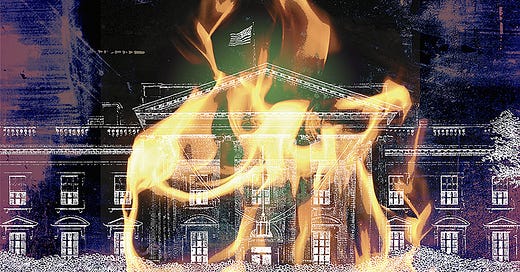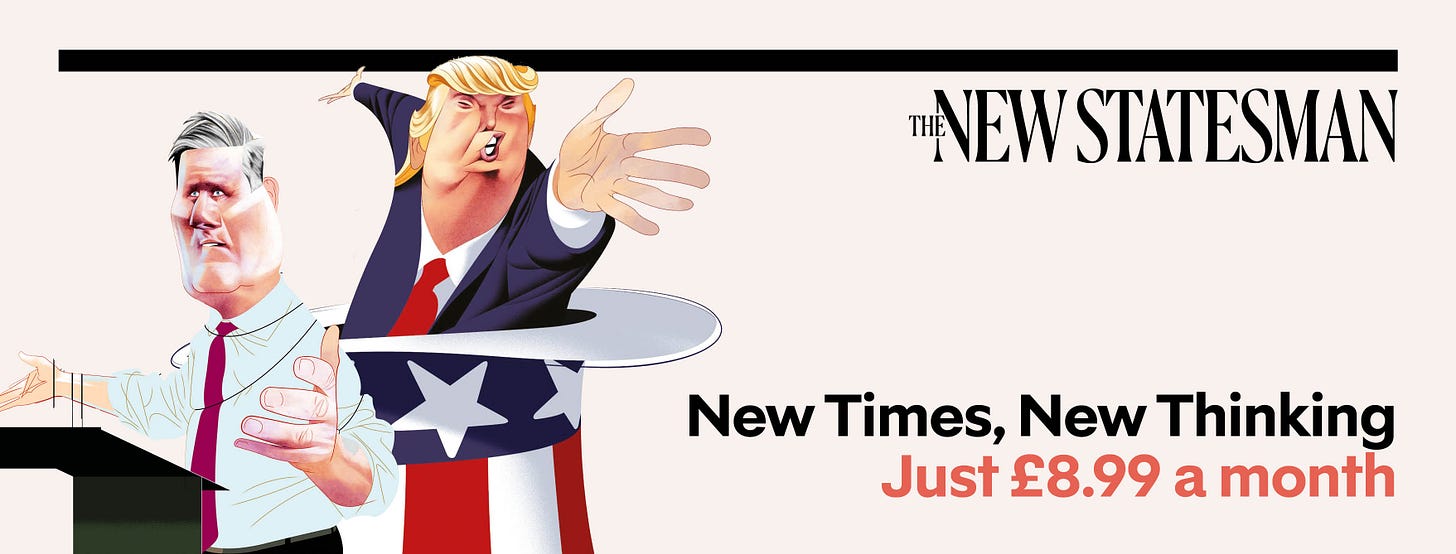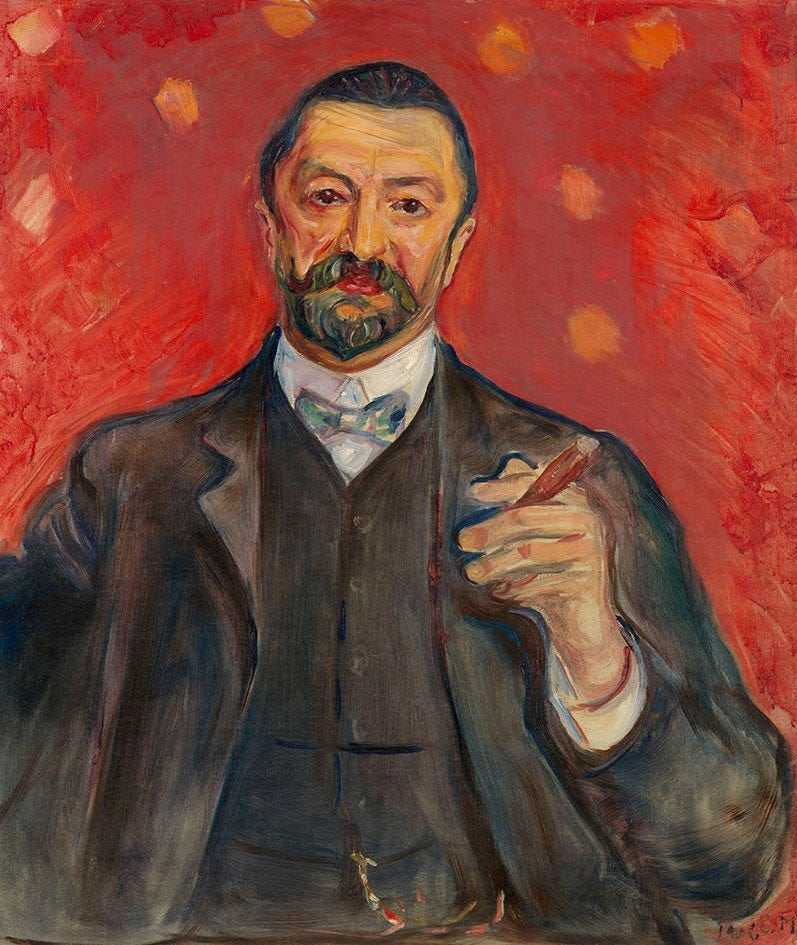The Saturday Read: Winning hand
Inside: Putin’s endgame, Yoko Ono, the so-called “positive male role model”, Munch’s portraits, Andrew Marr on Britain’s defence delusions, the White Lotus and Erdogan’s fate.
Good morning. Welcome to the Saturday Read, the best of the New Statesman, in print and online this week. This is Finn with George.
On Wednesday Chancellor Rachel Reeves announced £14bn of spending cuts. Low growth, high costs, a Trump administration retreating from Europe’s side: it is hard not to pity the Treasury for its gargantuan task of restoring some fiscal headroom to the books.
The innocence at the start of the decade is quaint to think about now, charming even: this was supposed to be the second coming of the roaring 20s. But George Eaton – as he wrote in our daily politics briefing, Morning Call, on Thursday – was sceptical at the time, and more so now. Instead, the 2020s are beginning to look more like “the decade that growth forgot” he says.
The OBR had already warned the tariffs planned by Donald Trump on 2 April – “liberation day” he’s calling it – could reduce UK growth. Not long after Reeves left the dispatch box, a rude interruption from the US president made those anxieties a reality: a tariff of 25 per cent would be imposed on all cars not manufactured in the US. The looming threat of further tariffs could, too, eliminate any of the room for fiscal manoeuvre the Treasury created on Wednesday.
Pity the industry. Lower demand for new vehicles and competition from China has already created a hostile financial landscape for British automakers. Legacy brands Jaguar, Land Rover, Bentley, Aston Martin and Rolls-Royce will likely be worst affected.
And what of the US carmakers? Earlier this month president Trump issued a warning to the CEOs of the country’s car manufacturers: Don’t even think about raising your prices because of these tariffs. (That should do it, then.)
More on all of that across the magazine and website this week. Meanwhile, read on below as the New Statesman’s own Kate Mossman introduces her new book, Men of a Certain Age, and Michael Prodger investigates the strange portraiture of Edvard Munch. As ever, thanks for reading and have a great weekend.
1—“Endgame”
For the first time in a while, the prospect of Russia winning this war is more than likely. But what does that look like to Putin? Ukraine subsumed under Russian influence as a larger and more prosperous Belarus, Katie Stallard suggests. FMcR
It would be one thing if Putin was confronted by a Western alliance that was demonstrably united. If Donald Trump had pre-empted his outreach to Moscow by travelling to Kyiv to announce a surge in American weaponry, for instance, and declared that the US commitment to Nato was ironclad, then Putin might have been more inclined to give a little ground. Instead, he sees an American leader who seems to have bought wholesale his narrative that the Russian invasion was justified by Nato’s expansion, and that the real barrier to peace is Zelensky. “You see the hatred he’s got for Putin,” Trump remarked during his conversation with Zelensky at the White House in February. “It’s very tough for me to make a deal with that kind of hate.”
2—“A war we cannot fight”
I wonder if the commentariat were a little quick in declaring Starmer’s good few weeks a “masterclass in statesmanship”. Thankfully Andrew Marr is here to inject some scepticism: Britain doesn’t have the cash to be so bellicose. FMcR
What is Starmer’s “coalition of the willing” for? Since it envisages British troops moving soon into Ukraine, and therefore into harm’s way, this urgent question ought to be asked. Yet it is barely discussed. The official answer is bland enough; that “the willing” will police, or guarantee, or “bolster” whatever peace deal is agreed between Russia and Ukraine. But how does that work? The Kremlin has said time and again that it will never sign a peace deal that allows Western troops inside Ukraine. Perhaps that’s a rare Putin joke but… if he won’t sign, there is no peace deal so there is nothing to police. There is no role for “the willing”. Here is an obvious, logical problem of sequencing which only President Trump could resolve.
3—“Semi-forgotten”
He spied for Britain for 20 years, raced Bugattis before the war, lived in Ibiza after it, shot guns, knew the Mafia… and you’ve never heard of Norman Lewis. The great John Gray puts things right in this review of a new Lewis collection. GM
In Naples, Lewis had another seminal experience. Dining with a friend in an unheated restaurant on what turned out to be horse meat, he watched as a group of little girls entered, dressed in black uniforms buttoned up to their chins, their hair cut short, prison-style, clinging to one another for comfort or protection, all of them weeping. Blind, famished orphans, they had been drawn in by the smell of food. Lewis expected his fellow diners to stop and hold out their arms, but everyone carried on as if the children were not there. Until then, he “had clung to the comforting belief that human beings eventually come to terms with pain and sorrow. Now I understood I was wrong, and like Paul suffered a conversion – but to pessimism… I knew that, condemned to everlasting darkness, hunger and loss, they would weep on incessantly. They would never recover from their pain, and I would never recover from the memory of it.”
4—“Exploitative, but art”
During his life, the world said Yoko Ono had swallowed up John Lennon like a whale. After his death, he swallowed her. Kate Mossman reviews the life of the “world’s most hated woman”. GM
Yoko is a lens through which to understand Lennon’s psychology. He called her mother: he’d always been looking for his mum. “Not bad, eh, mother?” he said one November morning in 1980, as he looked at Billboard magazine over breakfast and saw the couple’s album Double Fantasy creeping up the charts. He drew an arrow from number 25 to number one in red pen: “We’re on our way, mother!” He had just turned 40 and was by his own admission excited about the second half of life.
5—“Venal, obsequious”
The Dems’ inability to regroup is now almost as startling as their brutal defeat. Lee Siegel explains how the American left is stuck playing a game whose rules everyone else has chucked out, in favour of something more “blunt, colourful, irreverent”. GM
Last week, Tim Walz, recently Kamala Harris’s running mate, spoke like a populist, in the manner of a real person rather than a politician – Trump’s irresistible power – when he called Elon Musk “a South African nepo baby” and a “dipshit”. The left denounced Walz for, as the New York Times priggishly put it, “attack[ing] Musk with language from the Trump playbook”. (They have a “playbook”. We have a “strategy”.) Democrats appear to favour Bernie Sanders’ thrilling slogan: “Fight the Oligarchy!” Most Americans recoil at ten-dollar words. Many have no idea of what an oligarchy is.
To enjoy our latest analysis of politics, news and events, in addition to world-class literary and cultural reviews, click here to subscribe to the New Statesman. You'll enjoy all of the New Statesman's online content, ad-free podcasts and invitations to NS events.
There is just one greeting audible at pickup time in Britain’s playgrounds lately: “Have you seen Adolescence?” With a little help from Gareth Southgate, Netflix’s new smash hit show about a murderous pre-pubescent boy has set the national imagination ablaze. The problem, it seemed to me, is that the question welcomes the same, tired old refrain: “We really need some positive male role models.”
I think that’s a dead end. The “positive male role model” idea has great intentions – setting an example for young men to follow – but our cast of contenders is just too dignified, waistcoated and hygienic to have a chance of engaging angry youth.
Everyone in Britain cares about this issue of troubled young men. Maybe if we keep our mighty collective brain concentrated on this problem, we will make real progress soon. I remain sceptical for now, and here I take aim at the very concept of the role model.
Data and insight will be crucial to making British farms more sustainable, but farmers need clear and simple standards. Tesco has been working with British growers to roll out LEAF marque certification, giving farmers a clear framework. Read more here.
6—“Compulsive and odd”
Portraiture tends to be contractual: patron pays artist, artist paints patron (flatteringly). Not true of Edvard Munch, however. Michael Prodger delights again with his piece on the artist who “painted people for himself and painted them how he wanted to”. FMcR
His feelings for the psychiatrist Daniel Jacobson, the man who treated him when he had an alcohol-induced breakdown in Copenhagen in 1908, are also clear in his portrait. Munch thought him controlling, “a pope among white-dressed nurses”, and took his revenge in a flame-coloured picture in which he depicted the physician chest out, hands on hips, legs akimbo – a cock-of-the-walk in the wards. Jacobson was mystified as to why Munch had shown him that way. “In all seriousness, I am really worried about him,” he confided. “Just look at the picture he has painted of me, it’s stark raving mad.”
7—“Instant political infamy”
Istanbulites will not forget 19 March. So reports Kaya Genç, from a country in uproar after its president arrested a political rival. Whether this brings the conclusion of Erdoğan’s 22-year rule or not is impossible to predict. One truth holds in Turkey: everyone is afraid. GM
İmamoğlu’s current plight echoes Erdoğan’s political trajectory. In 1998, Turkey’s secular establishment threw Erdoğan, then a beloved mayor of Istanbul, into jail. Spectacular scenes accompanied Erdoğan’s arrest: tens of thousands gathered to see him off. After four months behind bars, he emerged from his cell as the most significant political leader in a country in deep economic and political turmoil. By jailing İmamoğlu on corruption charges with similar optics – but for a more extended period, at least for months before his trial begins – the AKP risks gifting the same hero’s journey arc to the most significant rival of Erdoğan’s career.
8—“Eat The Rich syndrome”
The White Lotus aspires to and falls short of serious social criticism. Sarah Manavis reports from the frontier of the show’s class war, and finds neither satire nor realism, but some very old tropes. FMcR
These dynamics are borne out in over-long scenes over-boring conversations. Even its best moments so far this season – such as a tense conversation between three girlfriends about one’s move to Texas and Trump-voting husband, which only really shines in the context of the show’s wider blandness – still are written as an impression of how these conversations might go from a liberal’s perspective. In another scene, the financier’s wife – played by Parker Posey – says of her daughter, who is considering moving to Thailand to study Buddhism: “She needs to learn to fear poverty, Tim, like everyone else we know.” This is hardly a believable line to be uttered by an actual millionaire about herself and her peers, but it certainly sounds like what someone critical of this type of wealth thinks the upper classes say to each other.
9—“Labouring under delusions”
US officials are reeling from the humiliation of mistakenly adding a reporter to a confidential group chat dedicated to discussing missile strikes on the Houthis. (Who among us hasn’t made that mistake.) Freddie suggests that behind the gaffe there is some real insight on Vance and Europe. FMcR
Hegseth goes on to suggest that strikes could be postponed – demonstrating the influence Vance has over foreign policy, despite occupying the traditionally irrelevant role of vice-president. Vance eventually concedes, posting: “If you think we should do it let’s go. I just hate bailing Europe out again” – a sentiment that Hegseth heartily agreed with, calling European freeloading “PATHETIC”. The Trump team has such disdain for Europe that missile strikes in Yemen are now being partly decided based on whether the operation will or will not punish Europe for having weak armies.
10—“Absurdity and occasionally cruelty”
John Harris’s article about raising a son with special needs, like his life with him, is “a story of joy in difficult circumstances”. It also sounds a howling alarm about the state of Send (special educational needs and disabilities) provisions in Britain. GM
And then things turned ugly. A parent’s natural instinct is to big up their child’s achievements – but when the council started scattering its submissions with plain falsehoods about James’s abilities, we had to push back. They said he could hold a pencil with the correct grip, so we had to say he couldn’t; they insisted he was able to work with other children, and for fear of weakening our case, we had to point out that this was wrong. It all deeply hurt, even though the council eventually agreed to most of what he required before a formal hearing. I write mostly for the Guardian and habitually vote Labour: it still feels strange acknowledging that ideas about the dead hand of the state and the awfulness of bureaucracies often ring true, but they do.
George’s Best of the Rest
Perry Anderson: Regime change in the West?
Jessica Laser: Does Robert Frost suck?
Cynthia L Haven: Miłosz, Camus, Einstein, and Weil. Not my dream five-a-side team.
Terry McDonell: Graydon Carter’s golden age
Jacob Savage: The vanishing straight white male writer…
…Nicholas Harris: A tech oligarch’s manifesto for changing the world
Denis Staunton: The Irish Times’s letter from China
World’s ugliest animal named fish of the year in New Zealand. Consolation prize.
And with that…
“Malcolm McLaren – rest in pieces! – spoke as though his every waking thought was an art statement,” Johnny Rotten told me. “And that is always the voice of the talentless!” Rotten is bored by punk, but he will forever be a punk, so he entertains himself by slagging it off. He was brought up on a council estate in Holloway and told me about looking into his father’s coffin as a child. Was it the first dead body he’d seen? “Oh come off it!” he cried, eyes popping: “With the lifestyles that poorer people led, coffins were being dragged in and out of flats at a fairly steady pace!”
Rotten is one of the nineteen ageing rockstars in my new book, Men Of A Certain Age, most of which were conducted with the New Statesman between 2015 and 2021. My specialist subject was an odd fit for the country’s leading politics magazine – I remember our former editor breathing “I can’t stand John Bon Jovi” when he surveyed the layouts on press day. “But rockstars are political!” I’d protest.
While Bon Jovi, the Bill Clinton of hair rock, predicted Trump’s triumph in 2016 when few others did, British rockstars were a distinct socio-economic group of their own: post-war self-made men, old Labour boys gradually sliding towards Tory. Shaun Ryder was briefly special advisor on class for David Cameron: he wished to elevate himself above the people he’d grown up with in Manchester – the type, he said, mysteriously, “who’d batter you and take your car.” The artist formerly known as Terence Trent D’Arby told me, “Oh my God, I can’t believe you thought I was a socialist! All artists are socialists until they see another artist with a bigger house than theirs.”
Purchasing a book may earn the NS a commission from Bookshop.org, who support independent bookshops.
The New Statesman is home to the finest writing on politics, culture and ideas. To stay up to date, subscribe using the link above.
— Finn, Nicholas and George.





















All the talk about the coalition of the willing ignores the fact that Ukraine needs more and better drones. The Russians are using the same meat grinder tactics they have always used and know that eventually Ukraine will run out of soldiers. We cannot supply soldiers to die for another country, after Iraq and Afghanistan, so it is munitions that we can and must supply. Is this happening? Or are we going to keep talking to the French and Germans about it and never get around to increasing our munitions supply?
Really loved this edition—especially the through-line of power dynamics, both geopolitical and personal. The Putin piece felt like a sobering reminder that narratives don’t win wars—strategy and attrition do. And Marr’s take on Britain’s “coalition of the willing” nailed the cognitive dissonance in projecting might without means.
The Yoko Ono piece was haunting and tender—less a profile, more a study in myth and memory. Same with the Munch piece: the idea that art can be an act of revenge is both chilling and oddly relatable.
Also, this line from “Eat The Rich Syndrome” stuck with me: "It sounds like what someone critical of this type of wealth thinks the upper classes say." There’s a broader theme here—the danger of writing from inside an echo chamber while claiming to critique one.
Thanks for continuing to blend sharp analysis with surprising emotional resonance. Always a worthwhile read.